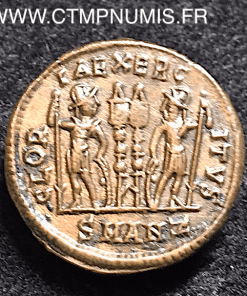


Paul bids Timothy to charge the rich of this world not to be high-minded, nor to trust in the uncertainty of riches (1 Tim 6:17). This passage proves that the rich man who does not sin by covetousness, nor by pride, must, indeed, be a man of tried virtue, with a heart adhering closely, by perfect charity, to God. Hence we read in Sirach, blessed is the rich man who is found without blemish who has not gone after gold, nor put his trust in money nor in treasures (Sir 31:8). Quod consonat verbis Domini dicentis quod difficile dives intrabit in regnum caelorum. Vere enim mirabilia facit qui in divitiis vivens divitiis affluentibus cor non apponit et si quis talis est, absque dubio probatur perfectus, unde sequitur Quis est probatus in illo, id est in hoc quod absque macula divitias habeat, et perfectus inventus est? quasi dicat: rarus, et hoc erit illi in gloriam aeternam. Sed quanto divitis taliter instituti maior est beatitudo et virtus, tanto talium divitum minor est numerus unde sequitur Quis est hic, et laudabimus eum? Fecit enim mirabilia in vita sua. dicit Divitibus huius saeculi praecipe non altum sapere, nec sperare in incerto divitiarum. Magnae enim virtutis dives esse ostenditur et perfecta caritate fixus in Deo, qui ex affectu divitiarum maculam peccati non trahit, qui post aurum concupiscendo non vadit, nec de divitiis confidendo per superbiam super alios se extollit unde Apostolus I ad Tim. dicitur XXXI, 8 Beatus est dives qui inventus est sine macula, et qui post aurum non abiit, nec speravit in pecunia et thesauris. We must not draw conclusions from wonderful deeds for the weak among us are more capable of wondering at and praising such deeds, than of imitating them. Neither, then, is it useless to counsel those that seek perfection to part with their earthly goods, although Abraham was perfect with all his wealth. The virtue, likewise, of Samson was eminent, for, armed only with the jawbone of an ass, he slew many of his enemies nevertheless the instruction which he gave to the soldier to take up arms in combat with his foes, was not unprofitable. The virtue of Abraham was very great for, although possessed of great wealth, his heart was detached from riches. Our Lord, we repeat, did not mean, by this counsel, that rich men cannot be perfect, or cannot enter into the kingdom of heaven but he meant that they cannot do so easily. If anyone should still argue that the counsel of our Lord concerning the renunciation of possessions is futile, because Abraham, though a rich man, was perfect, we will refer him for an answer to what has been already said. Nec ergo inutiliter datur consilium perfectionem desiderantibus ut dimittant divitias, quia in divitiis Abraham potuit esse perfectus facta enim mirabilia non sunt ad consequentiam trahenda, quia infirmi ea magis mirari et laudare possunt quam imitari. Magna ergo virtus fuit Abrahae quod etiam divitias possidens, a divitiis liberum animum habuit sicut magna virtus fuit Samson, qui absque armis cum sola mandibula asinae multos hostes prostravit: nec tamen inutiliter consilium datur militi, ut ad bellum procedens assumat arma ad hostes vincendos. Non enim Dominus ea ratione hoc dedit consilium quasi divites perfecti esse non possint, aut intrare in regnum caelorum sed quia non de facili possunt.

Si quis vero ex hoc arguere velit inutile esse consilium Domini de divitiis dimittendis, quia Abraham divitias possidens fuit perfectus, ad hoc iam patet responsio ex praedictis. Wherefore the Lord said to him, because you have done this thing, and have not spared your only begotten son for my sake, I will bless you (Gen 22:16). So perfect, indeed, was his love of God, that he showed it by his readiness to slay his son. The words of the Lord spoken to him, walk before me and be perfect, make it clear that the perfection of the patriarch was to consist in walking before God, and in loving him with a love so perfect that it reached to contempt of himself, and of all that belonged to him. Although he possessed wealth, he was detached from it. A rich man may be perfect if his affections be not entangled in his possessions, but devoted entirely to God. Et hoc significant verba Domini dicentis ad eum Ambula coram me et esto perfectus, quasi in hoc eius perfectionem esse ostendens quod coram Deo ambulaverit, eum perfecte amando usque ad contemptum sui et omnium suorum quod maxime in immolatione filii demonstravit, unde ei dictum est Quia fecisti rem hanc, et non pepercisti filio tuo propter me, benedicam tibi, Gen. Potest ergo contingere quod aliquis divitias possidens perfectionem habeat, caritate perfecta Deo inhaerens et hoc modo Abraham divitias possidens perfectus fuit, non quidem habens animum divitiis irretitum, sed totaliter Deo coniunctum.


 0 kommentar(er)
0 kommentar(er)
